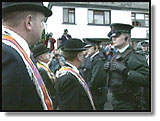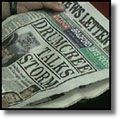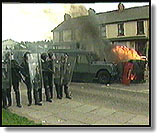
|
The Ulster Marching Seasonby BBC Ireland Correspondent, Mark DevenportParades and marches have been a feature of Ulster summers for decades - but it is only in the last five years or so that they have become the cause of so much tension and violence. Many older Catholics have memories of going out to watch Orange parades in the days before the 'troubles'. Now the marches are far more divisive, and the Catholic population either actively opposes them, as in areas like Portadown's Garvaghy estate and Belfast's Lower Ormeau Road, or gets out of the way - during the height of the marching season the resorts of County Donegal are full of Northern Ireland Catholics. The Republican analysis of marches is that they are 'triumphal','coat trailing' exercises by which the Protestant community asserts its dominance in Northern Ireland. A crucial episode in underscoring this view occurred on the Lower Ormeau Road in South Belfast in 1992, when Orangemen taunted local Catholic residents with shouts of 'five-nil' as they passed by. That taunt was a reference to the loyalist murder earlier in the year of five Catholics inside a bookmaker's in the area. That kind of behaviour contributed to the growth of 'nationalist residents group' opposed to marches through mainly Catholic areas without the consent of the local residents. As Gerry Adams put it in his Easter speech this year, the demand was "no talk, no walk". History and TraditionThe Orange Order and the other main loyalist marching organisation, the Apprentice Boys, date back to the eighteenth century. Both were associations of Protestants set up to commemorate famous victories by Protestant forces in the 1680s and 90s. The Orange Order remembers the triumph of the Protestant King William of Orange over the Catholic King James in the Battle of the Boyne in 1690, whilst the Apprentice Boys of Derry take their name from the 13 boys who closed the gates of Londonderry against King James's army in 1688 and withstood an eight-month long seige.
The Orange Order and the Apprentice Boys say that marching is an essential part of Protestant culture and all they want to do is to uphold long standing traditions. The routes they take were established decades ago, but areas have been subject to demographic changes, with Protestants moving out and Catholics moving in. Those population shifts underpin the fears the marchers have about giving up their traditional routes - if we lose the Garvaghy Road in Portadown today, they argue, we may lose Northern Ireland tomorrow. A paradox of the 'peace process' and the paramilitary ceasefires of 1994 was that in their wake, street disorder and clashes over the marches became more severe. On the nationalist side, people will tell you that this is simply because they have become more determined to assert their rights not to have parades which they find offensive passing through their areas. They say that gestures such as the 'victory march' by David Trimble and Ian Paisley after the Drumcree march in Portadown in 1995 makes it impossible to reach an honourable compromise. On the unionist side, there is a widespread belief that the marching issue has been deliberately whipped up by Sinn Fein as an alternative strategy to destabilise Northern Ireland. That unionist view was given more credence in March when an Irish television current affairs programme quoted Gerry Adams as having told an internal Republican meeting "Ask any activist in the North, did Drumcree happen by accident and they will tell you, no". Adams was also quoted as saying such situations had to be "developed and exploited". The Sinn Fein president never issued an outright denial of these comments which appeared to come from the transcript of a secret recording. Summer FlashpointsWhatever the truth, what about the situation this summer?There are various potential flashpoints around the province. Confrontation was avoided this Easter Monday on the Lower Ormeau Road in South Belfast when the Apprentice Boys chose to turn away when they came to a police line which marked the frontier with a Catholic area. The Apprentice Boys wanted to set the tone for an improved marching season, but there are still a number of parades planned for the Lower Ormeau which could spark trouble. Other potential troublespots include Bellaghy in County Derry and Dunloy in County Antrim. The blocking of Orange and Apprentice Boys parade in Dunloy has led to a particularly ugly dispute in nearby Ballymena where Protestants have been mounting pickets outside the Catholic church at Harryville. There was a move within the Orange Order to reach a compromise with the Dunloy residents over future parades. But the move, backed by the moderate Orange Grandmaster, Robert Saulters, was rejected by hardliners from the "Spirit of Drumcree" group. The clash between these two groups within the Order is still continuing on a number of fronts. The main Apprentice Boys parade is held in August in the centre of Londonderry - last year there were fears of violence in the city in reaction to events of Drumcree. In the event part of the route was blocked off and the situation remained peaceful. This year the nationalist Bogside residents' group in Derry has expressed concern, not only about the mid August parade but also about a gathering of Orangemen in the city scheduled for July 12.
But events in Derry are likely to depend on what happens in the most significant flashpoint, which is undoubtedly the Garvaghy Road in Portadown - the scene of the Orange Order's Drumcree Parade which led to a week of rioting and disruption last summer. The Northern Ireland Secretary, Mo Mowlam, and the newly appointed Parades Commission have thrown themselves into attempts to find a solution but at the time of writing no settlement appears in sight. The Orange Order has written letters to local Catholic residents stressing its moderacy. But it still refuses to meet the residents' coalition spokesman Brendan McKenna because of his past involvement with the IRA. This year Brendan McKenna's position as a representative is hard to challenge as he was elected in May's local government elections with nearly 1500 votes. The prospects for bringing the two sides together was made immeasurably harder by the IRA's murder of two RUC officers in nearby Lurgan just three weeks before the Drumcree parade was due to take place. In late June all sides appeared to be positioning themselves for possible confrontation, by putting applications in to the police for widespread marches, demonstrations and street festivals. If no settlement is found, the government faces some unenviable choices. Holding back the Orangemen at Portadown would please nationalists, but spark off a similar 'siege' to last year. Pushing a parade down the road as quickly as possible would avoid a stand off, but it would almost certainly lead to a backlash in other areas, principally Derry where nationalists have already indicated that they might actively oppose a demonstration the Orange Order has planned for July 12. Operationally, it may be that this summer the army takes more of the load off the RUC. Right now, the prospects for peace are not good. The Labour government is likely to provide the RUC Chief Constable, Ronnie Flanagan, with more political cover than the Conservatives gave to his predecessor Sir Hugh Annesley. But whoever makes the tough decisions, the consequences on either side will remain the same. |
Diana, Princess of Wales, 1961-1997
Conference 97
Devolution
The Archive
News |
Issues |
Background |
Parties |
Analysis |
TV/Radio/Web
Interactive |
Forum |
Live |
About This Site
News |
Issues |
Background |
Parties |
Analysis |
TV/Radio/Web
Interactive |
Forum |
Live |
About This Site
© BBC 1997 |
politics97@bbc.co.uk |


